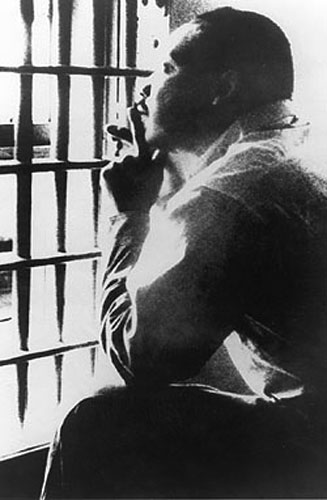"L'enfer c'est les autres"--JP Sartre This year, students will explore the theme of otherness. What defines the mainstream and how does this mainstream dictate to others? What does it mean to be marginalized? How has the mainstream impacted the world of ideas across the centuries?
Wednesday, October 27, 2010
Monday, October 11, 2010
Bluest Eye Notes week of 09/08/10
- self-hatred, not about racism
- narration: multiple, have to piece each one together
- different than poisonwood bible, white people refusing to understand black people, more about racism
- Pecola feels different than other people wants blue eyes: hates herself but not because of her skin color (not entirely)
- piece everything together only at the end of the book: Cholly, has no perception of what a family should be like.
- Structure is backwards
- Morrison focuses on the how and not the why
- Cholly (aka Charlie) is a tragic hero
- Pecola’s outcome is determined so is Cholly
- Choly’s inner turmoil has no boundries, he functions on hatred and tenderness.
09/09/10
- Nathan, Troy and Cholly don’t have the ability to provide and protect his family.
- Nathan feels guilty, didn’t want so many girls, was tormented.
- Nathan is ignorant, selfish and an egomaniac, he is naïve, refused to try and understand the natives
- He is ignorant, ignorance is a major theme of the book
- Ignorance: to deliberately shut out knowledge
- Nathan, Troy and Cholly have intimacy issues, all have a childhood trauma, translates through sex
- Lea and Mother evolve the most out of the family, Rachel remains ignorant
- Nathan is arrogant, also ignorant of what manhood is. What is the role of a man?
- Epistemology: What is knowledge? What is ignorance? What can we know? What should we know?
09/13/10
Bluest Eye Notes:
- Lorraine, Ohio -> no segregation, 1941
- True story
- This is not a book about racism, it is about black is beautiful and self-hatred, she is the most ugly, she is the “blackest”
- Claudia felt guilty
- They never speak about pecola “quite as its kept” they can’t even say her name
09/16/2010
- Introduction loses value third time because no spaces between words.
- Less and less meaning from version 1- 3
- Symbolizes Pecola’s evolution, her mind, her lifestyles, she can’t even focus on what’s the ideal and what she wants, everything is mixed together: words put together represents her reality.
- Juxtaposition between what it means and its inverse: IRONY
- Texts become more and more perverted: goes from natural to unnatural
- They have everything but there’s complete perversion
- IRONY: Pecola named after Peola character from movie “Imitation of Life”
What goes on in the mind of Cholly, Soaphead and Mr. Henry?
"Now I wish to introduce the following idea. Between the age limits of nine and fourteen there occur maidens who, to certain bewitched travelers, twice as many times older than they, reveal their true nature which is not human, but nymphic (that is, demoniac); and these chosen creatures I propose to designate as "nymphets." [...] But let us be civilized. Humbert Humbert tried hard to be good. Really and truly, he did. He had the utmost respect for ordinary children [...]. But how his heart beat when, among the innocent throng, he spied a demon child, "enfant charmante et fourbe,"dim eyes, right lips, 10 years in jail if you only show her your looking at her. So life went. Humbert was perfectly capable of intercourse with the EUve, but it was Lilith he longed for. The bud stage of breast development, [...] the first appearance of pigmented pubic hair [...]. My little cup grins with tiddles."Lolita, Nabovok. 16, 20.Story of a pedophile, who explains his cravings and adventures with his Lolita, Dolores.
There is obviously a "glitch" in all four of these men's minds. They have unnatural desires. Mrs. Reilly was saying that Mr. Henry was a worse offender than Cholly. I however disagree because in all cases these men use little girls as substitutes for their unrealized fantasies:
-Cholly: his inability to love, his longing for past happiness and freedom,
-Soaphead: his homosexual desires blocked by his hate of people, ...
For Mr. Henry, it is harder to discover but he is the one I associate most with Humbert Humbert: they seem nicest on the outside but are predators on the inside. The intricate workings of their mind are most dangerous.
The question here is whether what makes their offenses appalling is that they abuse a child's trust or that they are directed towards children. I lean towards the latter and that is probably why I find that there is no saying that one offender is worse than the other. What makes the offense bad for you?
Friday, October 8, 2010
Civil Disobedience
Click here for an annotated version of the text:
http://www.vcu.edu/engweb/transcendentalism/authors/thoreau/civil/
An individual who breaks a law that conscience tells him is unjust, and who willingly accepts the penalty of imprisonment in order to arouse the conscience of the community over its injustice, is in reality expressing the highest respect for the law. Dr. Martin Luther King, Jr.
Wednesday, October 6, 2010
Dick and Jane and Sesame Street....end of the bluest eye?
Here was a review of Sesame Street when it first came out. What do you think?
http://www.theatlantic.com/magazine/archive/1971/05/big-bird-meet-dick-and-jane/5125/
http://www.theatlantic.com/magazine/archive/1971/05/big-bird-meet-dick-and-jane/5125/
Tuesday, October 5, 2010
MLK "Letter from a Birmingham Jail"
Read the full text here:
http://www.africa.upenn.edu/Articles_Gen/Letter_Birmingham.html
View a clip here:
http://www.youtube.com/watch?v=knFojb020bY
http://www.africa.upenn.edu/Articles_Gen/Letter_Birmingham.html
View a clip here:
http://www.youtube.com/watch?v=knFojb020bY
Monday, October 4, 2010
Subscribe to:
Posts (Atom)


